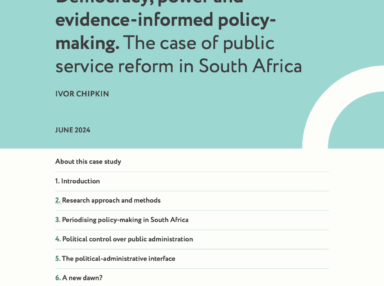On Contradiction et al.: Overcoming the Crisis of Government in South Africa
The New South Institute (NSI) is pleased to highlight a significant new contribution by our Executive Director and co-founder, Ivor Chipkin. His latest academic article, published in the Journal of Public Administration, delves into the ongoing crisis within South Africa’s government structures and offers a comprehensive analysis of potential reforms.
Titled “On Contradiction et al.: Overcoming the Crisis of Government in South Africa,” the article outlines five critical weaknesses in the organization of government that collectively contribute to what Chipkin terms a crisis. The paper examines the intricate balance between political control and management autonomy, a contradiction at the heart of public administration in South Africa.
Chipkin traces the roots of this issue back to the early legislative actions of the African National Congress (ANC) post-apartheid, particularly the Public Service Act of 1994. This Act centralized human resource and operational decisions under political leadership, a move intended to prevent obstruction by apartheid-era officials. However, this centralization also made every public servant a potential political appointee, blurring the lines between political and administrative roles.
In contrast, the global trend toward managerialism in public administration, which gained momentum during the same period, advocated for greater discretion and reduced bureaucratic constraints for government officials. This shift was embodied in South Africa by the Public Finance Management Act of 1999, which granted extensive financial autonomy to managers within departments. The resulting tension between empowered managers and politically controlled operations has led to persistent conflicts and inefficiencies within the government.
The article also evaluates several legislative reforms aimed at addressing these structural problems. These include the Public Service Amendment Bill (2023), the Public Administration Management Amendment Bill (2023), the Public Service Commission Amendment Act (2019), and the Public Administration Laws General Amendment Bill (2021). Chipkin assesses whether these reforms can resolve the fundamental issues of contradiction, confusion, capability, centralization, and corruption—what he identifies as the five Cs of the crisis.
The proposed amendments seek to delineate more clearly the roles and responsibilities within government, emphasizing the professionalization and depoliticization of public administration. Notably, the Public Service Amendment Bill aims to shift operational control from ministers to senior officials, enhancing the autonomy and accountability of public servants. Similarly, the amendments propose prohibiting political office bearers from holding administrative positions, thus reinforcing the separation between political and administrative functions.
Chipkin’s analysis underscores the importance of institutionalizing public administration practices that are consistent with constitutional values and principles. The article calls for a more coherent and capable public service, supported by robust legislative frameworks and effective oversight mechanisms.
For those interested in exploring the nuances of these critical issues and the proposed solutions, Chipkin’s full article is available for download in the Journal of Public Administration, Volume 59, Number 1, March 2024.



